Glenville Ashby | A journey of despair, courage and triumph
Book: My New Normal: Reflections of a Stroke Survivor
Author: Hilary Wehby
M y New Normal: Reflections of a Stroke Survivor relives the transformative experience of Hilary Wehby. It is a stark reminder of our vulnerability. Its message is daunting but hopeful. Life’s vicissitudes assail us at moments unexpected, moments that leave us scrambling for a foolproof response. We react, only to play catch-up. Little do we know that at the apogee of success, brimming with hubris, that fate steps in.
We can only pray to God for relief, hopeful that our supplication will fall on captive ears. It is belief that sustains us. Imagined or real, we surrender our burdens to a higher power. And like biblical Job, we must believe that our anguish is a test, a probationary challenge for a greater good. Our belief is our only defence against capitulation.
Vividly, Wehby recounts that fateful day: “November 11, 2015, started out as any ordinary day in a fairly ordered life … . I set about preparing to go off to work, reminding myself, as I dressed, that mine was a totally comfortable existence.”
But self-assurance and aplomb were dealt a decisive blow. A bright day grew dark. Wehby suffered a stroke. The rhythm of a charmed life was broken.
She pens, “I had an ischemic stroke in the right hemisphere of my brain. The entire left side of my body was severely affected, but I have discovered that a stroke does not mean that you have to give up on living, even if the brain attack leaves you barely alive and breathing.”
She adds, “The experience really brought me face-to-face with the saying: ‘once a man-twice a child’ and knocked right out of me, any trace of self-satisfaction and pride that I may have harboured.”
Wehby reflects on the perennial questions pondered by the wise ones of yore, the avatars that promoted silence, filial piety, and aesthetics.
She echoes these sentiments.
Embrace life
In her ordeal, Wehby embraces life. She is more reflective and attuned to the subtleties of daily living, hitherto ignored.
Never will she convince naysayers that God was instrumental in her recovery, but hard-pressed they are to ignore her belief in Isaiah 38:17 – “Surely, it was for my benefit that I suffered such anguish.”
In the vein of Victor Frankl, a valiant Wehby emerges to accept a Herculean challenge. At the crossroads, one chooses. Unlike others, she is decisive. A life of meaning she envisions. It is a catalytic moment, her metanoia. Of the purpose for her suffering, she well understands.
“One of the things I have come to appreciate is the gift of quiet, unhurried moments … . I have learnt that giving your loved ones the gift of unhurried moments of your time when you are one hundred per cent ‘present’ and in no way distracted is indeed a precious and priceless gift.
“I learnt for sure that we really are not indispensable. Valued and loved perhaps – at work, by our family and friends perhaps – but indispensable? NO! Even if we have flirted with the idea that we are, it’s just not true. And yes, our desk will be occupied the next day, with love no doubt, but the show will go on.”
Wehby was more than physically stricken. She was left searching for answers. “I even went as far as questioning whether my God had abandoned me, or simply didn’t care. At other times, I feared that God was angry with me for something I had done or left undone.”
Although these thoughts proved ephemeral, they spurred a deep philosophical enquiry into meaning and truth.
Psychological hurdles
Physically, the road to recovery was expectedly foreboding. But more so were the psychological hurdles. “There were times when I felt terrified as I pondered my future. What kind of mother, wife, and daughter would I be in this condition? What do persons using a bedpan, and needing strong orderlies to move around, do for the rest of their life? This was scary stuff.”
She details the arduous task ahead: “One of the first things I had to deal with was learning to look to the left again. Since I had a ‘left-side-neglect’, my brain didn’t remember I had a left side … Early on, I used to force myself to keep my head turned completely to the left so as to provide constant feedback to my brain from the left side, such as when I was being driven or pushed in a wheelchair at the mall. Sometimes I had to ask visitors to sit on my left side to engage that side.”
Authentic and richly presented, My New Normal is a quintessential statement on faith, courage and gratitude. It avers that we are part of a whole, a gestalt that heals the mind, body and spirit. It is a bold, uncompromising narrative that is timely and equally compelling.
My New Normal: Reflections of a Stroke Survivor
Copyright (C) 2019 by Bala Press
Bala Press, Kingston, Jamaica
ISBN: 978-976-95722-2-5
Ratings: Highly recommended
Feedback: glenvilleashby@gmail.com or follow him on Twitter@glenvilleashby


